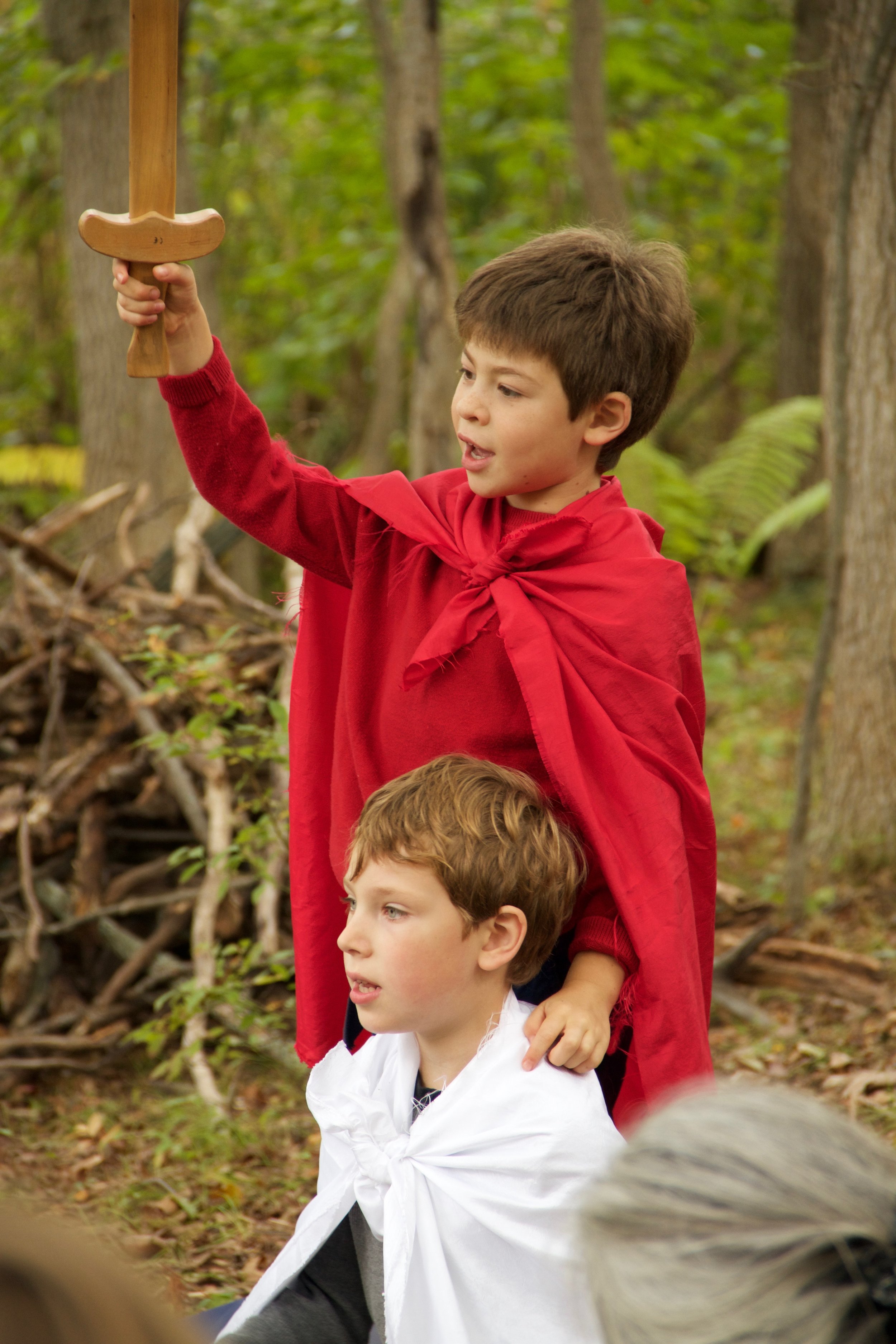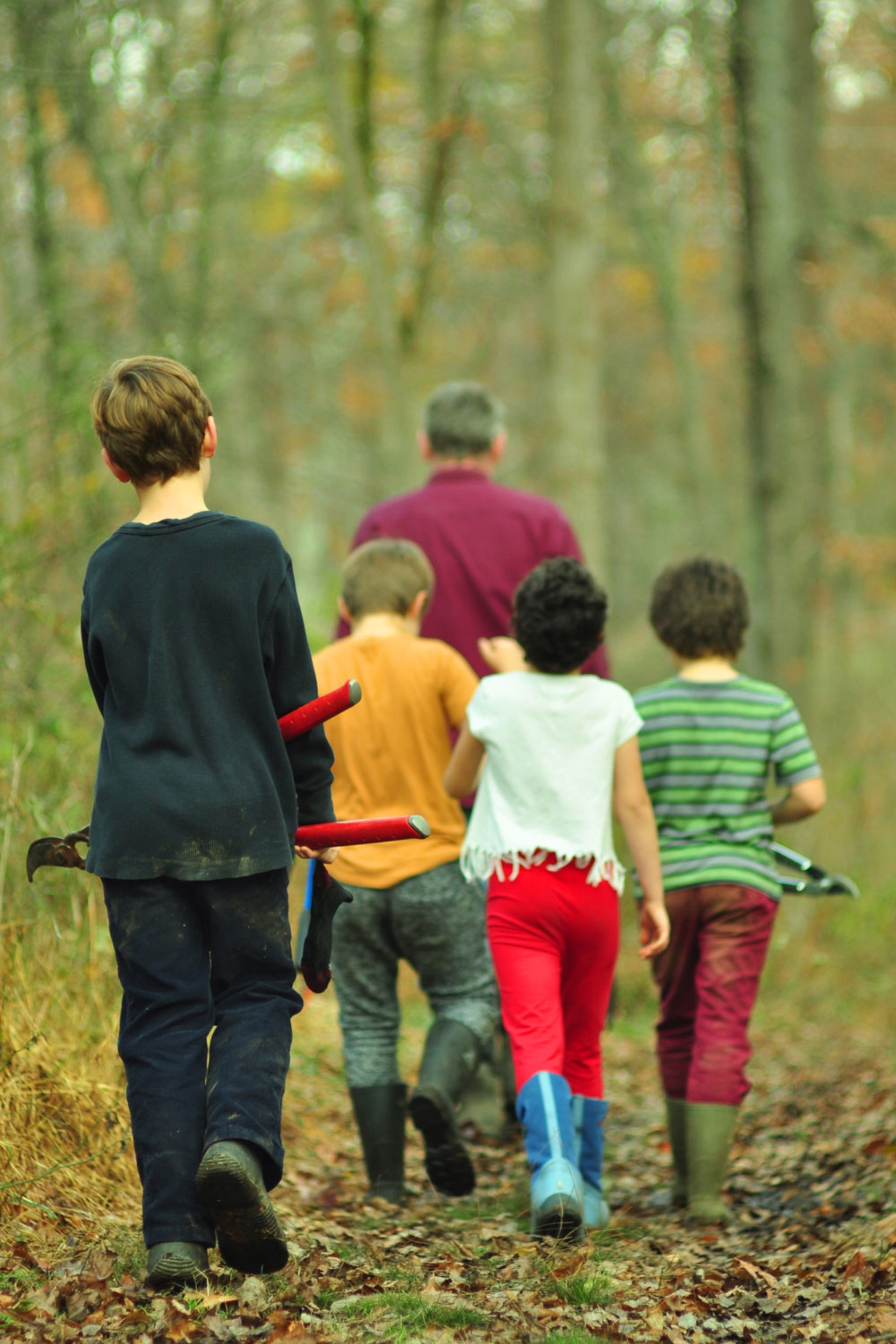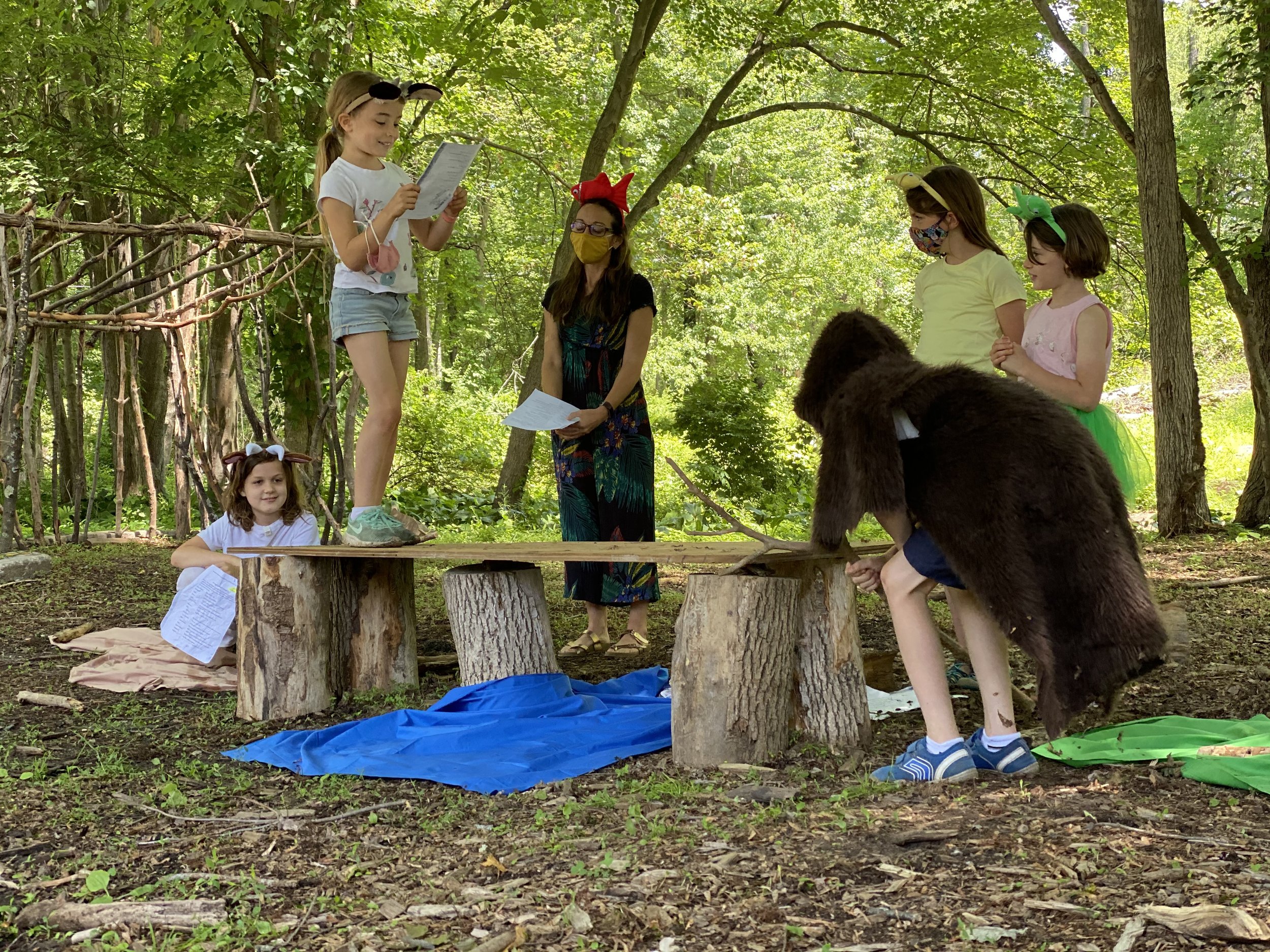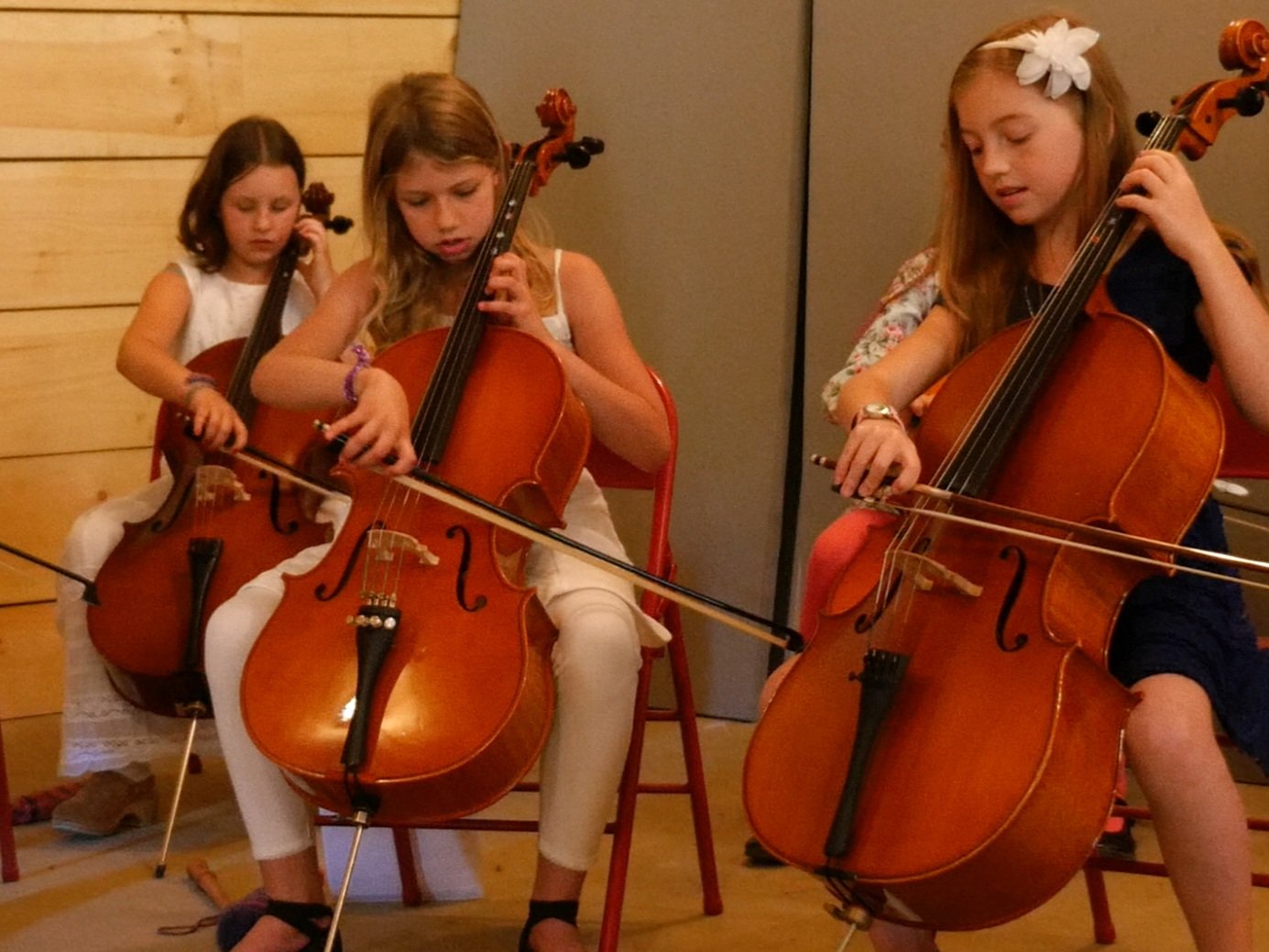Early Childhood through Sixth Grade
Early Childhood
Our Nursery and Kindergarten classrooms lay a foundation of beauty and creativity for the young child.
Children engage in songs, stories, puppet shows, rhythmic games, dramatic play, outdoor play, and nature walks.
These activities cultivate language, memory, imagination, fine and gross motor skills, coordination, and concentration, and set the stage for academics and problem solving in the grades.
First Grade
Entering the Kingdom of Childhood with a sense of wonder and imagination: Fairy Tales, Nature Stories
Language Arts: Letter formation and sounds to symbols, story review supporting sequencing – reading comprehension, sight words, speech exercises, rhymes, poetry, phonemic awareness, reading and reading simple verses/stories, capitalization, simple punctuation
Arithmetic: Number formation, quality/number sense, the four processes, whole to parts, mental math, skip counting
Arts: Form drawing, singing, pentatonic flute, painting, modeling, drama (class play)
Additional Subjects: Gardening, Farming, Handwork, Spanish, Music, Eurythmy
Second Grade
Exploring human potential and the relationship between choices and consequences: Holy People, Fables
Language Arts: Continued progress with reading, writing teacher-composed summaries of oral stories, writing sentences, speech exercises
Arithmetic: Multiplication facts, more mental math, more work with the four processes, adding columns, double digit addition, place value, borrowing, carrying, number patterns
Arts: Form drawing, poetry, singing, pentatonic flute, speech, painting, modeling, bean bags, drama (class play)
Additional Subjects: Gardening, Farming, Handwork, Spanish, Music, Eurythmy
Third Grade
Self-reliance through practical problem-solving: Farming, Cooking, Building Shelters, Hebrew Legends, Creation Stories
Language Arts: Grammar, sentence structure, punctuation, spelling rules, parts of speech, writing sentences and paragraphs, speech exercises
Arithmetic: solidification of times tables through 12, measurement, prime numbers, long division, money, and Practical Arts: house building, shelters, farming, gardening, textiles, cooking
Arts: Form drawing, poetry, song, painting, modeling, bean bags, drama (class play)
Additional Subjects: Gardening, Farming, Handwork, Spanish, Music, Eurythmy, Orchestra (Strings)
Fourth Grade
Emotional self-awareness and objective reasoning: Norse Mythology, Local History, Geography, Zoology
Language Arts: verb tenses, adverbs, prepositions, personal pronouns, work with grammatical rules, plurals, abbreviations, composition writing, spelling rules and tests, abbreviations, poetry, letter writing, speech exercises
Arithmetic: fractions, factorization, averages, word problems
Arts: Form drawing, poetry, song, recorder, speech, painting, modeling, bean bags, drama (class play)
Additional Subjects: Movement, Gardening, Farming, Handwork, Spanish, Music, Eurythmy, Orchestra (Strings)
Fifth Grade
Harmony at the mid-point between childhood and adolescence: Ancient India, Persia, Egypt, Greece, US Geography, Botany, Olympics
Language Arts: active and passive verbs, use of capitals, antonyms, writing compositions with an emphasis on descriptive writing, book reports, letter writing, spelling, punctuation, synonyms, homonyms, syntax, dictionary, spelling
Arithmetic: decimals, mixed numbers, reciprocals, the Metric system, free-hand geometric drawing
Arts: Form drawing, poetry, song, recorder, painting, modeling, drama (class play)
Additional Subjects: Practical Arts, Movement, Gardening, Farming, Handwork, Spanish, Music, Eurythmy, Orchestra (Strings)
Sixth Grade
Curiosity, contrasts and understanding of the developing self: Geology, Ancient Rome, Geometry, Astronomy, Charcoal Drawing, Middle Ages, Business Math, Physics, World Geography
Language Arts: Informational summary writing, dictation, novel writing, playwriting, prepositional phrases, use of thesaurus and dictionary, focus on spelling, latin and greek roots, poetry recitation
Arithmetic: Geometric drawing and formulas, order of operations, exponents, business math, graphs, word problems, compass and straightedge, measurement
Arts: Charcoal study, class play, advanced watercolor painting, graphite sketching, still life drawing, illuminated lettering, bookmaking, geometric drawing
Additional Subjects: Practical, Movement, Gardening, Farming, Handwork, Spanish, Music, Eurythmy, Orchestra (Strings)
Special Subjects in the Grades
Spanish
Spanish lessons begin in first grade. The purpose of teaching foreign language is to develop the ability to create an understanding of the nature of language through comparisons of the language studied and their own. Foreign language cultivates an interest in and respect for others & their cultures and students strengthen what they have learned by song, art, class plays & movement activities.
Handwork
Through work with natural fibers, Handwork begins in Early Childhood with finger knitting, braiding and simple hand stitching. Handwork then expands through grade school with knitting, crocheting, embroidery, hand sewing and more. The rhythmic repetition of knitting, crocheting and sewing strengthen the children's concentration and hand-eye coordination and enhance math skills through counting rows and stitches, measuring out patterns, and creating three-dimensional items. The children learn to correct their mistakes and value quality, utility and hard work as well as an appreciation and sense of fulfillment from their completed work.
String Ensemble
The students at Primrose Hill School hear and participate in music everyday, starting in Early Childhood with seasonal songs and games. At Primrose Hill, starting in third grade, the students begin learning to play a string instrument. We encourage the students to exercise their own intuition by choosing their instrument; cello, violin or viola. They practice together in class settings as well as individual lessons curated to meet the child where they are.
Farm & Garden
Through farming and gardening the children learn how we are connected to each other and the Earth. Students, along with their Farm & Garden teachers plant, dig, harvest and hear stories of nature. The students develop an understanding of seasonal cycles, the food that nourishes our bodies & souls, animal care, tool usage, plant cultivation and much more. Their work as farmers supports sensory integration and provides time for healthy movement.
Games & Movement
Games & Movement is a guided form of active play. Games & Movement creates a framework for following rules & directions, impulse controls, and hard and fine motor skills. Structured games help create a sense of teamwork, hand-eye control, as well as understanding cause & effect actions. Younger grades concentrate on creative game play, whereas the older students start learning how to play formalized sports, prepare for pentathlons and learn archery.
Age guidelines for each grade
1st Grade: Child will have turned 6 by June 1 prior to entering 1st grade.
2nd Grade: Child will have turned 7 by June 1 prior to entering 2nd grade.
3rd Grade: Child will have turned 8 by June 1 prior to entering 3rd grade.
4th Grade: Child will have turned 9 by June 1 prior to entering 4th grade.
5th Grade: Child will have turned 10 by June 1 prior to entering 5th grade.
6th Grade: Child will have turned 11 by June 1 prior to entering 6th grade.














